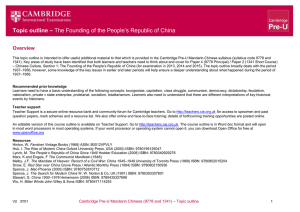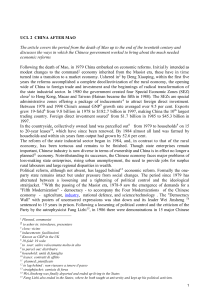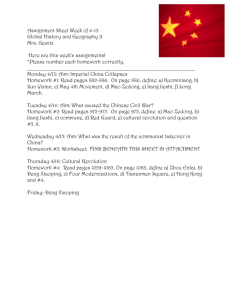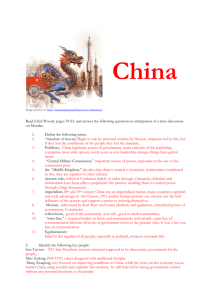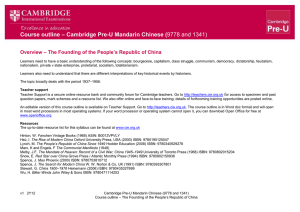Timeline – Cambridge Pre-U Mandarin Chinese (9778 and 1341) www.XtremePapers.com
advertisement
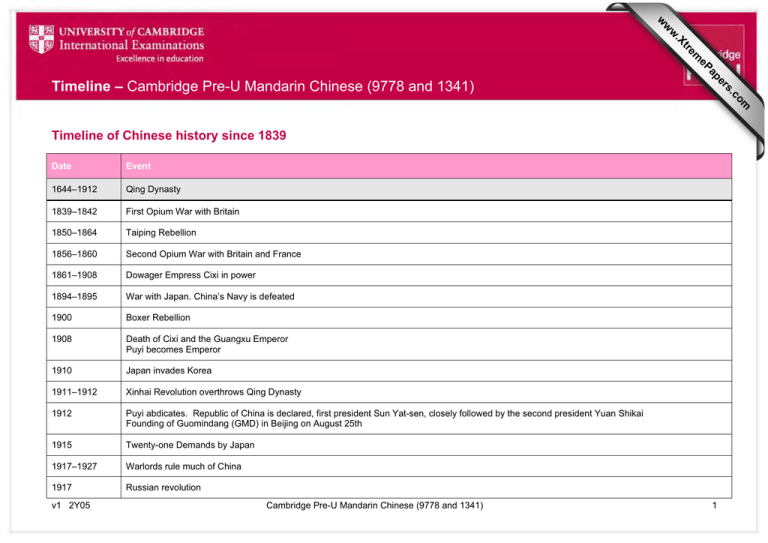
om .c s er ap eP m e tr .X w w w Timeline – Cambridge Pre-U Mandarin Chinese (9778 and 1341) Timeline of Chinese history since 1839 Date Event 1644–1912 Qing Dynasty 1839–1842 First Opium War with Britain 1850–1864 Taiping Rebellion 1856–1860 Second Opium War with Britain and France 1861–1908 Dowager Empress Cixi in power 1894–1895 War with Japan. China’s Navy is defeated 1900 Boxer Rebellion 1908 Death of Cixi and the Guangxu Emperor Puyi becomes Emperor 1910 Japan invades Korea 1911–1912 Xinhai Revolution overthrows Qing Dynasty 1912 Puyi abdicates. Republic of China is declared, first president Sun Yat-sen, closely followed by the second president Yuan Shikai Founding of Guomindang (GMD) in Beijing on August 25th 1915 Twenty-one Demands by Japan 1917–1927 Warlords rule much of China 1917 Russian revolution v1 2Y05 Cambridge Pre-U Mandarin Chinese (9778 and 1341) 1 Date Event 1919 Treaty of Versailles cedes former German possessions to Japan May 4th Movement 1921 Chinese Communist Party (CCP) is founded in Shanghai 1923–1927 First United Front between GMD and CCP 1925 Death of Sun Yat-sen 1926 Chiang Kai-shek [Jiang Jieshi] becomes leader of GMD 1926–1927 Northern Expedition defeats Northern Warlords and end of First United Front 1927 Massacre of Communists by Nationalists 1927–1937 Nanjing the capital of China 1927–34 Jiangxi Soviet regime is set up by CCP 1931 Japanese invade Manchuria. Manchukuo is set up as puppet state 1933–1934 Fifth Encirclement Campaign by Chiang Kai-shek puts increasing pressure on the Jiangxi Soviet 1936 Xi’an Incident 1937–1945 Second United Front between GMD and CCP 1934–1935 Long March from Jiangxi to Shaanxi Mao Zedong becomes leader of CCP after Zunyi Conference 1937–1945 War with Japan – Japan invades the rest of China. The war with Japan ends with the surrender of Japan at the end of the Second World War 1937–1945 “Yan’an Period”: CCP experiments with land reform; Mao develops his Chinese version of Marxism-Leninism; the “mass line”; policies on art and literature; democratic centralism and means of resolving conflicts within the party: rectification and thought reform; emphasis on class struggle 1945–1949 Civil War between Nationalists and Communists – ends with victory for the Communists v1 2Y05 Cambridge Pre-U Mandarin Chinese (9778 and 1341) 2 Date Event 1949 1st October: Mao declares the founding of the People’s Republic of China (PRC) 1950 Marriage Law is promulgated Sino–Soviet Friendship Pact 1950 People’s Liberation Army (PLA) enters Tibet 1950–1952 Land Reform 1950–1953 War in Korea; Chinese support for North Korea 1951 Suppression of counter-revolutionaries Three Antis campaign (waste, corruption, inefficiency) 1952 Five Antis campaign (industrial sabotage, tax evasion, bribery, fraud, theft of government property) 1953 Death of Stalin Cooperatives are introduced 1953–1957 First Five-year Plan 1956 Collective farms are introduced 1956–1957 Hundred Flowers Campaign 1957–1958 Anti–Rightist Campaign 1957–1959 The building of Tiananmen Square 1958–1961 Great Leap Forward People’s Communes are established 1958–1962 Widespread famine in which tens of millions die 1959 Uprising in Tibet. Dalai Lama flees to India Lushan conference v1 2Y05 Cambridge Pre-U Mandarin Chinese (9778 and 1341) 3 Date Event 1960 Soviet advisers are withdrawn from China 1962 War with India 1963 Mao’s Little Red Book becomes a standard Chinese text 1964 First Chinese atom bomb is tested 1966 Mao reappears in public and swims in the Yangzi River 1966–1976 Great Proletarian Cultural Revolution 1967 Deng Xiaoping is dismissed from senior government post China produces own hydrogen bomb 1969 Border clashes with USSR 1971 PRC replaces Taiwan in UN 1972 Nixon visits China UK establishes full diplomatic relations with China 1973 Deng Xiaoping is reinstated 1976 Deng Xiaoping is dismissed from office Deaths of Mao, Premier Zhou Enlai and Zhu De (Commander-in-Chief of the People’s Liberation Army) Tiananmen incident in Beijing on the occasion of the memorial service for Zhou Enlai Arrest of the Gang of Four 1978 Deng Xiaoping returns to power Responsibility System in agriculture. Communes begin to be disbanded Cultural Revolution begins to be denounced Market reforms are started The Third Plenum of the Central Committee of the CCP begins the destruction of Mao’s legacy v1 2Y05 Cambridge Pre-U Mandarin Chinese (9778 and 1341) 4 Date Event 1978–79 Birth and demise of Democracy Wall 1979 One-child Policy is introduced 1980 Trial and sentencing of the Gang of Four 1986 Student demonstrations 1989 Student demonstrations in Tiananmen Square and in the streets of Beijing Massacre in Beijing 1997 Death of Deng Xiaoping Hong Kong returns to China 2001 China joins World Trade Organisation 2003 Shenzhou 5 spacecraft puts first Chinese astronaut in space 2008 Olympic Games are held in Beijing 2011 Tiangong spacestation is launched v1 2Y05 Cambridge Pre-U Mandarin Chinese (9778 and 1341) 5
